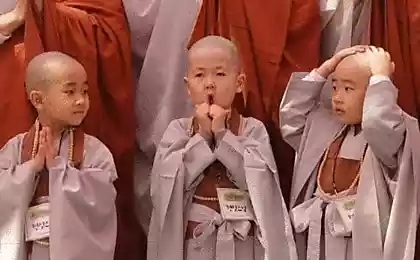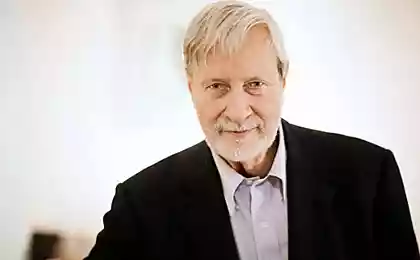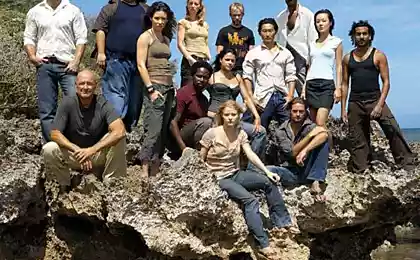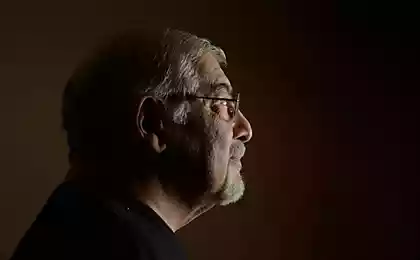737
Jorge Bucay: 3 truths that do not depend on time or circumstances
In search of the truth to all we meet on our life's path with different ideas. They gradually germinate in our minds and possess us, creating for some time our belief system.
But then a part of these truths are discarded or because the need for them has disappeared, or they do not stand up to our doubts.
Maybe because the new truth we were obsessed incompatible with previous and competing within us for "a place under the sun."
Or just because these truths cease to be important to us.
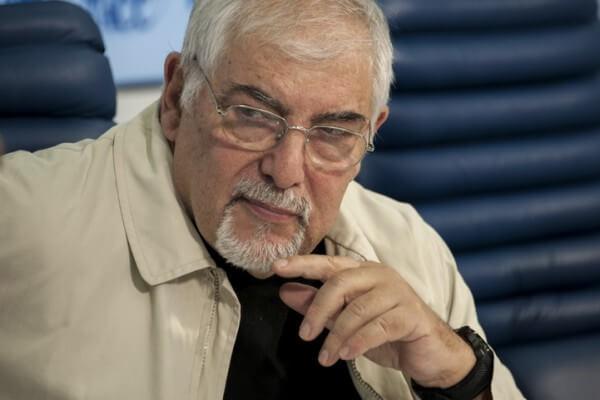
And we are lost. In any case, judgments on which we relied has been questioned.
Imagine that, standing at the helm of his sailboat, knowing all of your options, you can not choose the right course.
I remembered the book by Antoine de Saint-Exupery "the Little Prince".
Remember?
"While traveling through the small planets in his galaxy, he met a Geographer, who noted in the large registration book of the mountains, rivers and stars.
The little Prince wanted to make my flower (the one left on his planet), but the Geographer said to him:
— We do not record flowers because it is impossible to record the ephemeral.
And the Geographer explained to him what "ephemeral" means under threat of imminent extinction.
Hearing this, the Little Prince was very much distressed. He realized that his rose is ephemeral..."
And I asked myself a question: is there a truth unshakable as a rock, and unchangeable, as the familiar landscape outside the window? Or the truth as ephemeral and fragile as plucked a flower?
The scale of the macrocosm it may sound like this:
— Did the mountains, rivers and stars is also not threatened by imminent extinction?
What does "soon" compared to "always"?
And not out in this case, that the mountain is too ephemeral?

I would like to try to write about some of the ideas-the mountains, the ideas-rivers, ideas stars, whom I met on the way.
Some of these truths, of course, others seem controversial. Maybe one day they will become such for me. But now they are, in my opinion, complete and accurate, and moreover, they can be subjected to an impartial evaluation — they stand the test from the point of view of common sense.
1. The first truth is an integral part of the philosophy of Gestalt therapy is the thought of how to know that:
That is, there is
I write this and think about how disappointed the reader: "what is, is!" This is the truth?
This judgment we often don't take into account, despite its obviousness. It contains three important elements, which I think should be noted: first, the knowledge of "what is, is" means that we must take actions, events, and situations as they are.
Reality is not what I would like to see her.
It is not what it should be.
Is not what, as I said, it will be.
Is not what was.
Is not what will happen tomorrow.
The reality around me such what is.
My patients and students, after hearing how I repeat this assertion, see in it some humility, obedience, reluctance to be in fighting form.
In my opinion, you must always remember that changes can occur only when we realize the way things are.
How can I determine the route to new York, if you do not know in what part of the Universe you are? I can go only from a specific point, whether on the map or the starting point of my journey. And that means accepting the situation for what it is.
The second part of this truth is directly related to the first, is as follows:
I am who I am
And again:
I'm not the man I want to be.
I'm not who I ought to be.
I'm not the kind of person my mother wanted me to be.
I'm not even who I was.
I am who I am.
By the way, in my opinion, all of our mental anguish and the wound is the result of negation of a certain state of Affairs. All of our neurosis begins when we try to change ourselves and become who we are.
In the book "I want to tell you about...," I wrote about-denial:
...It all started the gray day when you stopped to proudly say:
I AM...
And, shamefully, with fear
bowed his head and changed
your words and actions
terrible thoughts:
I OUGHT TO BE...
...And if it is hard to accept that I am who I am, how much sometimes difficult to accept the third part of truth, which follows from propositions "what is, is":
You... whoever you are
Namely:
You're not what I wanted you to be.
You're not who you were.
You're not who I would be more comfortable to see you.
You are not like I want.
You are who you are.
To accept it means to respect you and not demand you change.
I recently brought myself the definition of true love, to love means to unselfishly create conditions to ensure that the other was who he is.
This judgement is the beginning (in all senses of the word, that is, first and foremost) of any Mature relationship. When I accept you for who you are, and I understand that and you accept me for who I am.

2. The second truth, it is extremely important to me, has its origin from Sufi wisdom:
Nothing good is given for free
And so it follows, in my opinion, at least, two conclusions:
First:
Second:
And how bad?
Unless it is not in vain?
If with me something bad is happening, this is in response to your actions? I deserved this?
It is possible that this is so. However, I am only talking about those truths which are undeniable to me. About the universal truths, truths without exceptions.
And to me, the statement: "I deserve everything that happens to me, including and bad" is not. This is not always the case.
I can assure you that familiar with some of the survivors of the victims adversity and certain failure completely uncalled for.
To accept this truth (nothing good is given for free) — so say goodbye to children's idea of what someone owed me something because I want to. The notion that life should give me what I want, "just because I want it." Just because I have a fabulously lucky.
3. The third truth on which to rely, I would be laid out like this:
Nobody can do what he wants
BUT
everyone is able to never do,
what he does NOT WANT
I repeat to myself:
Never do what I want.
Make this statement and live according to this principle difficult. This also isn't free. I remind you — nothing good is given for free. And that's good.
What I mean? If I'm a grown man, nobody will say me to do something I don't want to. The highest price I can pay for it, the price of my life.
I understand that life is the most important thing I have, and in no way detracts from its value. But I still think that think, "I won't do certain things" does not mean that it will cost me my life. One is not always related to one another, and between these statements is not an equality sign.
In everyday life, usually the issue price is much lower. The only thing needed really is to refuse to wait on others praise, approval, love. Sometimes it can be very frustrating. Often the price you have to pay when you dare to say no, is to open the ugly side to their friends, watch as they turn to you a back, neck and other body parts... to see them go.
These three truths for me — ideas-the mountains, the idea of river, idea star.
Truths that do not depend on time or circumstances.
It is those principles that do not refer to any particular point in time, but in each moment to ensure that collectively we call "our life."
The TRUTH-the MOUNTAINS given to us in order to build your house on a solid Foundation.
The TRUTH RIVER, to quench our thirst and go with him in search of new horizons.
The TRUTH STAR, to point the way for us even in the darkest of nights...posted
© Jorge Bucay
P. S. And remember, just changing your mind — together we change the world! ©
Source: //rumagic.com/ru_zar/sci_psychology/bukay/0/j18.html
But then a part of these truths are discarded or because the need for them has disappeared, or they do not stand up to our doubts.
Maybe because the new truth we were obsessed incompatible with previous and competing within us for "a place under the sun."
Or just because these truths cease to be important to us.

And we are lost. In any case, judgments on which we relied has been questioned.
Imagine that, standing at the helm of his sailboat, knowing all of your options, you can not choose the right course.
I remembered the book by Antoine de Saint-Exupery "the Little Prince".
Remember?
"While traveling through the small planets in his galaxy, he met a Geographer, who noted in the large registration book of the mountains, rivers and stars.
The little Prince wanted to make my flower (the one left on his planet), but the Geographer said to him:
— We do not record flowers because it is impossible to record the ephemeral.
And the Geographer explained to him what "ephemeral" means under threat of imminent extinction.
Hearing this, the Little Prince was very much distressed. He realized that his rose is ephemeral..."
And I asked myself a question: is there a truth unshakable as a rock, and unchangeable, as the familiar landscape outside the window? Or the truth as ephemeral and fragile as plucked a flower?
The scale of the macrocosm it may sound like this:
— Did the mountains, rivers and stars is also not threatened by imminent extinction?
What does "soon" compared to "always"?
And not out in this case, that the mountain is too ephemeral?

I would like to try to write about some of the ideas-the mountains, the ideas-rivers, ideas stars, whom I met on the way.
Some of these truths, of course, others seem controversial. Maybe one day they will become such for me. But now they are, in my opinion, complete and accurate, and moreover, they can be subjected to an impartial evaluation — they stand the test from the point of view of common sense.
1. The first truth is an integral part of the philosophy of Gestalt therapy is the thought of how to know that:
That is, there is
I write this and think about how disappointed the reader: "what is, is!" This is the truth?
This judgment we often don't take into account, despite its obviousness. It contains three important elements, which I think should be noted: first, the knowledge of "what is, is" means that we must take actions, events, and situations as they are.
Reality is not what I would like to see her.
It is not what it should be.
Is not what, as I said, it will be.
Is not what was.
Is not what will happen tomorrow.
The reality around me such what is.
My patients and students, after hearing how I repeat this assertion, see in it some humility, obedience, reluctance to be in fighting form.
In my opinion, you must always remember that changes can occur only when we realize the way things are.
How can I determine the route to new York, if you do not know in what part of the Universe you are? I can go only from a specific point, whether on the map or the starting point of my journey. And that means accepting the situation for what it is.
The second part of this truth is directly related to the first, is as follows:
I am who I am
And again:
I'm not the man I want to be.
I'm not who I ought to be.
I'm not the kind of person my mother wanted me to be.
I'm not even who I was.
I am who I am.
By the way, in my opinion, all of our mental anguish and the wound is the result of negation of a certain state of Affairs. All of our neurosis begins when we try to change ourselves and become who we are.
In the book "I want to tell you about...," I wrote about-denial:
...It all started the gray day when you stopped to proudly say:
I AM...
And, shamefully, with fear
bowed his head and changed
your words and actions
terrible thoughts:
I OUGHT TO BE...
...And if it is hard to accept that I am who I am, how much sometimes difficult to accept the third part of truth, which follows from propositions "what is, is":
You... whoever you are
Namely:
You're not what I wanted you to be.
You're not who you were.
You're not who I would be more comfortable to see you.
You are not like I want.
You are who you are.
To accept it means to respect you and not demand you change.
I recently brought myself the definition of true love, to love means to unselfishly create conditions to ensure that the other was who he is.
This judgement is the beginning (in all senses of the word, that is, first and foremost) of any Mature relationship. When I accept you for who you are, and I understand that and you accept me for who I am.

2. The second truth, it is extremely important to me, has its origin from Sufi wisdom:
Nothing good is given for free
And so it follows, in my opinion, at least, two conclusions:
First:
- if I want to in my life happened something good, I just have to know that it will have to pay. Of course, this is not always the money (otherwise it would have been easy!). The price is sometimes very high, sometimes very low, but it's always there! Because nothing good is given for free.
Second:
- you must understand that, if I get outside something good, if I happen joyful and pleasant events, is because I deserved them. I paid for them I worthy. (Just to warn the pessimists and to discourage cheaters, I will explain: for the good that's happening to me now, I already paid for. And can not be EPP!)
And how bad?
Unless it is not in vain?
If with me something bad is happening, this is in response to your actions? I deserved this?
It is possible that this is so. However, I am only talking about those truths which are undeniable to me. About the universal truths, truths without exceptions.
And to me, the statement: "I deserve everything that happens to me, including and bad" is not. This is not always the case.
I can assure you that familiar with some of the survivors of the victims adversity and certain failure completely uncalled for.
To accept this truth (nothing good is given for free) — so say goodbye to children's idea of what someone owed me something because I want to. The notion that life should give me what I want, "just because I want it." Just because I have a fabulously lucky.
3. The third truth on which to rely, I would be laid out like this:
Nobody can do what he wants
BUT
everyone is able to never do,
what he does NOT WANT
I repeat to myself:
Never do what I want.
Make this statement and live according to this principle difficult. This also isn't free. I remind you — nothing good is given for free. And that's good.
What I mean? If I'm a grown man, nobody will say me to do something I don't want to. The highest price I can pay for it, the price of my life.
I understand that life is the most important thing I have, and in no way detracts from its value. But I still think that think, "I won't do certain things" does not mean that it will cost me my life. One is not always related to one another, and between these statements is not an equality sign.
In everyday life, usually the issue price is much lower. The only thing needed really is to refuse to wait on others praise, approval, love. Sometimes it can be very frustrating. Often the price you have to pay when you dare to say no, is to open the ugly side to their friends, watch as they turn to you a back, neck and other body parts... to see them go.
These three truths for me — ideas-the mountains, the idea of river, idea star.
Truths that do not depend on time or circumstances.
It is those principles that do not refer to any particular point in time, but in each moment to ensure that collectively we call "our life."
The TRUTH-the MOUNTAINS given to us in order to build your house on a solid Foundation.
The TRUTH RIVER, to quench our thirst and go with him in search of new horizons.
The TRUTH STAR, to point the way for us even in the darkest of nights...posted
© Jorge Bucay
P. S. And remember, just changing your mind — together we change the world! ©
Source: //rumagic.com/ru_zar/sci_psychology/bukay/0/j18.html

